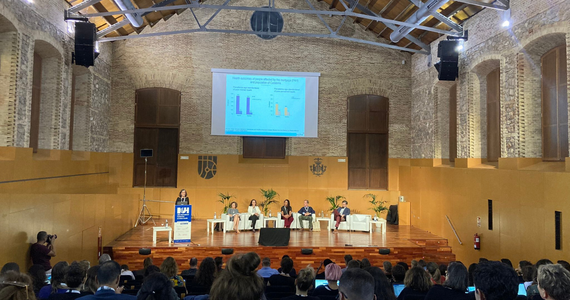Cities for Health and the Environment
Posted on
October 28, 2022
 Dean Diez Roux speaks at a panel at the 2022 International Conference for Urban Health.
Dean Diez Roux speaks at a panel at the 2022 International Conference for Urban Health.
By Dean Ana V. Diez Roux, MD, PhD, MPH
This past week several of us represented the Drexel Urban Health Collaborative and our School at the International Conference for Urban Health organized by the International Society for Urban Health (ISUH). I have been to this conference several times, but this year I realized how unique it really is: first in its global breadth, and second in that it engages not only researchers but also practitioners, policymakers, government, non-profits and even funders. The global focus and the participation of a range of urban health stakeholders allows for dialogues that often do not occur at traditional scientific meetings. How can we partner to “make things happen” in urban health? What kinds of innovative funding is needed? What can high income countries learn from urban polices implemented in low- and middle-income countries? What does thinking “systemically” about urban health really mean? And so many more.
The Dornsife School of Public Health was well represented. Salud Urbana en America Latina/Urban Health in Latin America (SALURBAL) had many presentations, two panels, and a side event. We also shared the important work we are doing in partnership with the Big Cities Health Coalition, including the development of data dashboards, improving data on health equity, and contributing to the development of an urban health agenda. And there were more. We had presentations by Dornsife faculty, staff, and students. You can read more about our contributions to the meeting here.
Together with advancing health equity and translating evidence into policy, promoting health in cities is one of the three focus areas of our School as described in our strategic plan. Work on urban health is woven through all our Departments and Centers including the Urban Health Collaborative. We now have an MPH in Urban Health and our introduction to urban health class (taught by Alex Quistberg and Ana Ortigoza, a big thank you to both!) is growing increasingly popular. Our ability to bridge U.S. and global urban health research and policy translation is one of our big strengths. Wouldn’t it be great to bring together the health commissioners of the cities in the U.S. Big Cities Health Coalition with those of Mexico City, Sao Paulo, Buenos Aires, Barcelona, London, Nairobi, Dehli, Beijing, and Sydney, just to name a few… Of course, many of the lessons about how to best act to improve health in cities are relevant to other areas, including so-called “suburban” areas and even rural areas. And we are fortunate to have experts at our School across the full continuum.
The meeting took place in beautiful Valencia, Spain, a city that just recently was honored as the 2024 Green European Capital, in recognition of its work to increase green infrastructure; promote urban biodiversity, climate change mitigation, energy efficiency, sustainable food, and mobility; and recover public space for all to use. Much of the center city is pedestrian and a beautiful greenway built on an old river traverses the whole city. We enjoyed real Valencian paella (no seafood, and please only for lunch!), delicious horchata (a slightly sweet drink made of chufa or tiger nuts), and even Basque cider. It was a pleasure to spend time with friends and colleagues.
Shortly after I arrived in Philadelphia, back in May 2014 I participated in a couple of “Jane’s Walks” created in many U.S. cities to commemorate the work of Jane Jacobs around the time of her birthday in early May. In her famous book, “The Life and Death of American Cities,” Jane Jacobs wrote “Cities have the capability of providing something for everybody, only because, and only when, they are created by everybody.” The walks were a fantastic introduction to the city that has now been my home for nearly nine years. Going to the urban health conference reminded me of the potential of cities to promote health and well-being, environmental sustainability, and social justice. May our School contribute to the creation of cities for everybody and by everybody as Jane Jacobs said, cities that create opportunity, health, and well-being for all people, and that protect the environment and life on our planet.